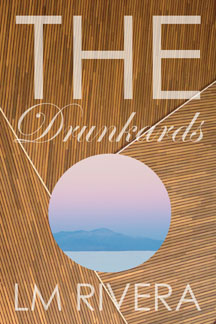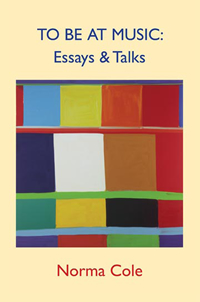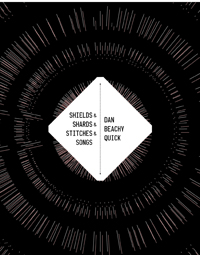Description
When Duchamp’s Bride Stripped Bare was shattered/damaged/transformed upon being relocated to the Brooklyn Museum, through this violent act, this accidental fracture, a new manifestation of the medium was born. So too in LM Rivera’s The Drunkards is there violence against the body, not in and of itself, but the body as symbolic mover; and in the interplay between intoxication and violence, in being intoxicated on one’s own violence, so too do violence and transformation become habituated in art. This intoxicated personhood transcends the divisions of the biological self, elevating consciousness to the selfless space of The Book, a constantly unfolding interiority in which the self’s unspecialness is allowed to touch the sublime.
The Drunkards fixes stillness in light-dunked ecstasy. Anxiety-pumped and ghost-voiced, LM Rivera urgently rolls out a new plan for language. The results are unsettling and poignant.
Avital Ronell
For LM Rivera, poetry is a desert where voices speak out of the air, in dialogue, in chorus, or murmur outlandishly, inside our own “somniferous” skulls. The voices say: The Kingdom of the Book may never get here, but it’s always arriving. In these extraordinary poems, critical thought mingles with apocalyptic feelings as we wander, lost and ecstatic in our thirst. We read them to get ready.
Joseph Donahue
LM Rivera deploys every technique known to humanity for representing dialogue. From Spicer he learns to split the page in two, with different voices proceeding in parallel at top and bottom. From Dickinson he learns to mark the space between utterances with a dash. From Celan he learns to compound multiple words into a single word. From Jabès he learns to amplify his own text with a Talmudic commentary. And he takes copious epigraphs (more than I can count or identify) from other voices in the great dialogue of civilization. This is a book of traditional knowledge, in other words. What gives it such a sharp impression of strangeness? There is another, esoteric dimension of dialogue in this book that has no name and is best represented by the bizarre figure of drunkenness. The drink goes inside and the voice gets drunk and within it another voice opens up.
Aaron Kunin
The work’s hybridity suggests that responses to art can take many forms that do not always follow the strict, limiting conventions of scholarly exegesis. Rivera cautions readers against “those that domestically wait—signaling out to gather tragedy—disgracing minor observations—fearing the heightened sum.” This, too, operates as ars poetica, as a self-conscious commentary on the work’s place in the fixed stillness of the canon.
The Drunkards fixes stillness in light-dunked ecstasy. Anxiety-pumped and ghost-voiced, LM Rivera urgently rolls out a new plan for language. The results are unsettling and poignant.
Rivera’s poems are wonderfully drunk in their effervescence, playfulness, brightness, as well as in their stumbling poetic textures. . . . Rivera explores and explodes the possibility of the book as artifact, shaking it loose from its binding while imagining diverse enumerations: the book written in dust, the book as a litany of books heaped on each other, or the book as ‘negatives in acerbic radiance.’
I am more than impressed at how elegantly this collection moves. As the narratives are closely linked and move so gracefully throughout, the reader would want to read this one cover to cover, and would emerge from the world of it more enlightened, and certainly as impressed as I was when I read this very riveting work. Highly recommended for the inquisitive reader—even the casual one, who has even an inkling of curiosity.
Reviews
About the Author
Excerpt
LM Rivera is a writer. He co-edits Called Back Books with Sharon Zetter. He is the author of a chapbook, The Little Legacies (Glo Worm Press, 2016) and two poetry collections, The Drunkards (Omnidawn, 2018) and Against Heidegger (Omnidawn, 2020). He is a tutor, a filmmaker, an artist, and a father.
I
“By saying ‘quiet’, you halt the possibility, however: it must be said for that possibility to appear—for the unfamiliar to stay—for the good to be born and buried—lions here amid unfamiliar guests— saying a ‘language’—increasing the room, yet to come.”




